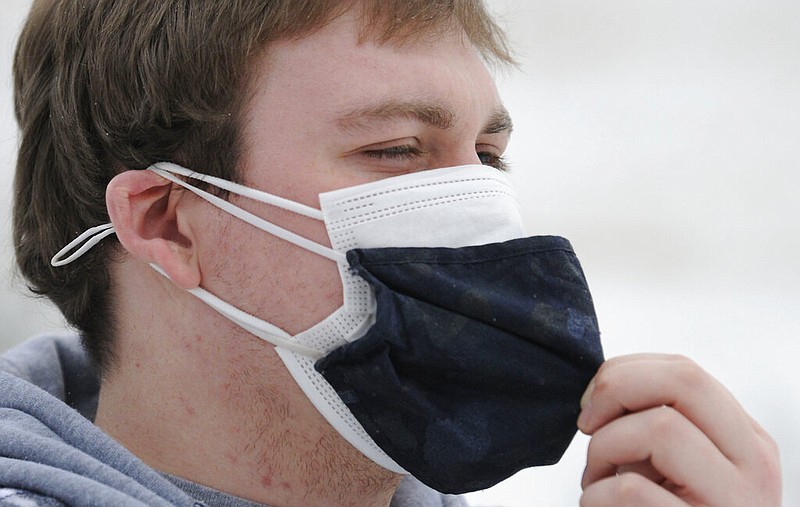Are two face masks better than one when it comes to preventing the spread of COVID-19? Leading infectious disease expert Dr. Anthony Fauci said last week that double masking is "common sense" as new, more contagious coronavirus variants threaten to sweep the country.
Dr. William Schaffner, a professor of infectious diseases at Vanderbilt University Medical Center, said the effectiveness of wearing two face masks hasn't been studied. However, it's "reasonable" to think the practice might offer some additional protection.
While Schaffner and other local experts agree that double masking can't hurt, what's most important - they said - is that people in the Chattanooga region continue practicing the same safety measures they've preached since the spring.
"That's the principle issue - there are still many, many people who are not wearing masks, or who wear masks intermittently, or who wear them incorrectly below the nose. That doesn't count," Schaffner said. "So, the first thing I would say is, let's walk before we run. What we need to do is wear our masks."
He said average people still have a hard time with the notion that they could have the virus and be infectious without showing any symptoms.
"They could be a dreaded spreader - contagious to others but feel perfectly well... That's why [masking] is not a matter of individual choice," Schaffner said. "There are times we all give up our independent decision-making capacity in order to function together...Not wearing a mask is like driving on the red [light]. It's not just you, pal. It's everybody else around you that you put at risk."
(READ MORE: Hamilton County mask mandate extended through March)
Dr. Jay Sizemore, an infectious disease specialist at Erlanger Medical Center, echoed Schaffner's sentiments during a public board meeting Thursday evening.
"I highly respect the opinion of Dr. Fauci. I certainly don't think double masking is going to hurt. But again, I think if you're masking correctly and consistently and being careful with social distancing and hand hygiene, you will continue to do an adequate job of protecting yourself," Sizemore said.
Dr. Fernando Urrego, interim health officer for Hamilton County, said via an emailed statement that although double masking could help, the U.S. Centers for Disease Control and Prevention is not recommending that people wear two masks at this time, and Hamilton County Health Department will continue to follow the CDC recommendations.
"What is more important is the quality of the mask and assuring that it is used correctly," he said. "Two-layered, single masks using high-quality cotton material with a relatively high thread count is ideal. Multi-layer single masks have shown to be effective in blocking up to 70% of fine droplets and particles."
If the CDC recommendations and research changes, Urrego said the health department will update its recommendations.
For those who would prefer the possibility of more protection, Schaffner gave the "go ahead" to wear two face masks.
"But make sure that the first mask you put on is on correctly - over your nose and as tightly as possible around your cheeks and chin," he said. "The more layers you have, the more protection you will get. But also the work of breathing will get a little harder, and so you just need to keep that in mind."
Some people prefer to seek out N95 masks, which are thicker, tight-fitting masks that filter air and are typically worn by health care providers. While they are technically better at protecting the wearer and others around them more than a regular cloth or surgical mask, Shaffner said they only work when worn properly.
Health care workers are trained to put N95s on correctly and are used to wearing them, he said. Because they're sealed tight around the edges, they make breathing more difficult. Facial hair can also interfere with the seal, so thick beards render them ineffective.
"Most people I've seen who are not health care workers who wear N-95s haven't got them on correctly," Schaffner said. "If you do use it correctly, yes, it provides more protection. We're not recommending that, because we need N-95s for health care workers."
Contact Elizabeth Fite at efite@timesfreepress.com or follow her on Twitter @ecfite.
